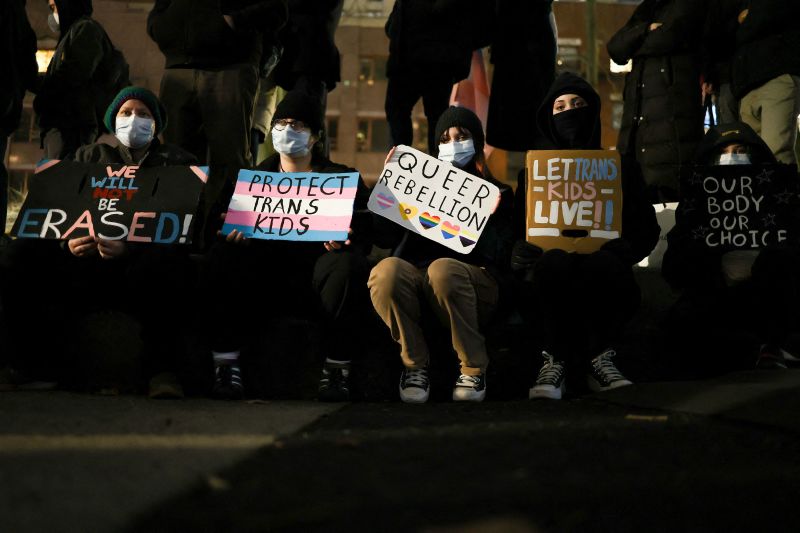Several social justice groups said Tuesday that they are suing the Trump administration over its new restrictions on gender-affirming medical care for children.
On January 28, Trump signed an executive order called “Protecting Children from Chemical and Surgical Mutilation,” which instructed federal agencies to take immediate steps to deny federal funding to any institution that provided gender-affirming medical care for people under the age of 19.
Gender-affirming care is considered medically necessary, evidence-based care that uses a multidisciplinary approach to help a person transition from their assigned gender – the one the person was designated at birth – to their affirmed gender – the gender by which one wants to be known.
For children, the American Academy of Pediatrics advises doctors to provide developmentally appropriate, nonjudgmental treatment in a safe clinical space. The care is individualized and based on peer-reviewed scientific studies that show what is effective. Providers and counselors will often work with the child, and may also work with their family, their school and the community.
More than two dozen states have passed laws restricting access to such care, but nearly every major medical association considers gender-affirming care to be gold-standard treatment.
One organization, Transhealth in Massachusetts, said on its website that it will continue providing care: “We are not going anywhere, and we will not stop fighting for you and our communities.”
However, PFLAG, an organization that advocates for LGBTQ+ people and their families and one of the plaintiffs in the new lawsuit, said it has received calls from parents across the country whose children’s appointments are being canceled.
“Those families and countless other families are being harmed right now by this executive order, whether because they had an appointment for scheduled care canceled or their health care providers have been coerced through threat of federal funding loss to preemptively shut down gender-affirming care services,” Brian Bond, PFLAG’s chief executive officer, said Tuesday.
Some people receiving gender-affirming care choose to use puberty blockers, medications that can delay puberty, a developmental phase that can be distressing for someone who is transgender. Studies show that transgender adolescents who used puberty blockers were less likely to have suicidal thoughts than those who wanted the treatment but did not get it.
The medications are the same that are used when someone goes through precocious puberty, which is when a child’s body changes into that of an adult too soon. Pubertal suppression is reversible.
Surgery can be another approach included in gender-affirming care for adults, but few surgeries are performed on children in the US. VCU Children’s said it was suspending surgical procedures for people under the age of 19, and Children’s National said it never offered a surgical option for children.
The new legal challenge was filed by groups including the ACLU, Lambda Legal and GLMA on behalf of two young transgender adults, five transgender adolescents and their families whose health care has been disrupted by the executive order. Many of the plaintiffs are not named.
One parent who is identified, Kristen Chapman, says she moved to Richmond so her child Willow could have access to a gender-affirming care program that accepted the family’s Medicaid insurance. The family had lived in Tennessee, which passed a law that banned gender-affirming medical care for minors starting in 2023. The US Supreme Court is considering whether that law is constitutional.
Chapman said she tried to get her 17-year-old an appointment at VCU Children’s for months and was finally able to get a spot for January 29. It was the day after Trump signed the executive order.
On the day of the appointment, VCU Children’s told the family that it would no longer be able to provide care for Willow.
“I thought Virginia would be a safe place for me and my daughter. Instead, I am heartbroken, tired and scared,” Chapman said at a news conference Tuesday. “I’ve had to leave the only home my children ever knew to build a new one entirely from scratch and even separate my family just to get the health care my daughter needs.”
Alex Sheldon, executive director of GLMA, which represents LGBTQ+ health care professionals, said his group has spoken with dozens of members trying to navigate the “chaos” that the executive order has caused. One nurse, Sheldon said, said they had to cancel a patient’s appointment, and the child’s mother said it would be the nurse’s fault if the child were to die by suicide.
Sign up here to get The Results Are In with Dr. Sanjay Gupta every Friday from the CNN Health team.
“They called me in tears, realizing that their career had been dedicated to caring for people and they were no longer able to do so because of the fear that this instilled in their institution,” Sheldon said.
“Providers are scrambling to handle hundreds of calls from terrified families,” Sheldon added. “They are under immense unwarranted scrutiny. They worry for their futures and the futures of their patients.”
The lawsuit was filed in federal District Court in Maryland and will be followed by a request for an immediate restraining order against the enforcement of the executive order.
On Monday, New York state Attorney General Letitia James sent a letter to health care providers and other organizations warning that despite the executive order, they needed to follow state laws that protect against discrimination based on several categories, including sexual orientation or gender identity.
“Electing to refuse services to a class of individuals based on their protected status, such as withholding the availability of services from transgender individuals based on their gender identity or their diagnosis of gender dysphoria, while offering such services to cisgender individuals, is discrimination under New York law,” the letter said.

